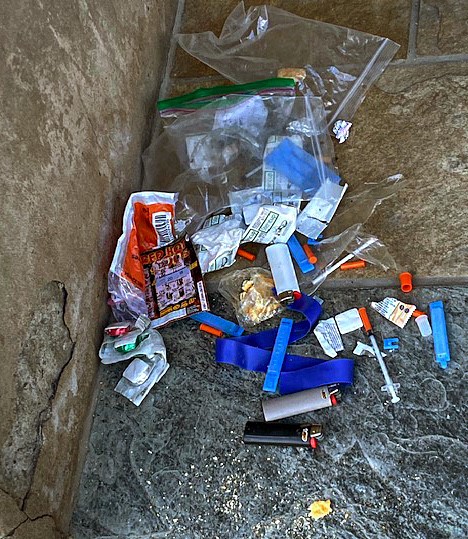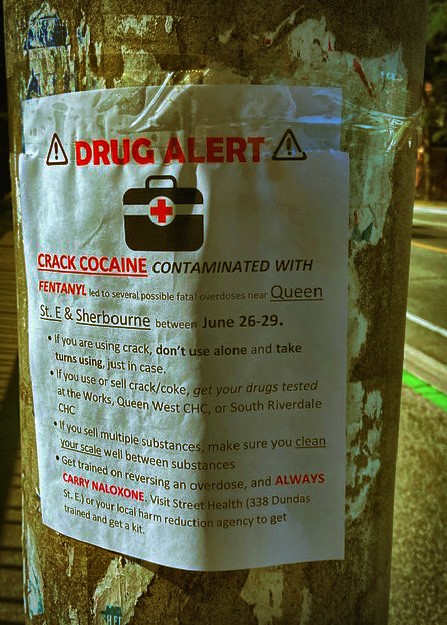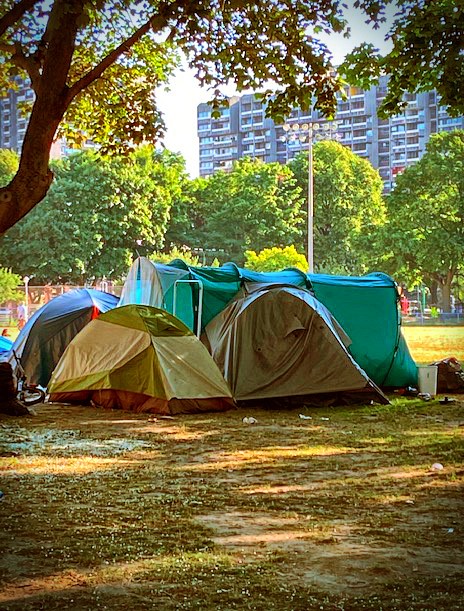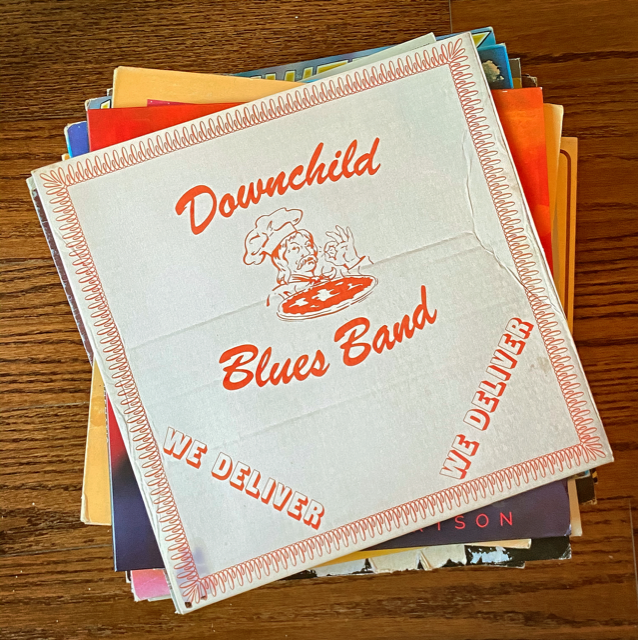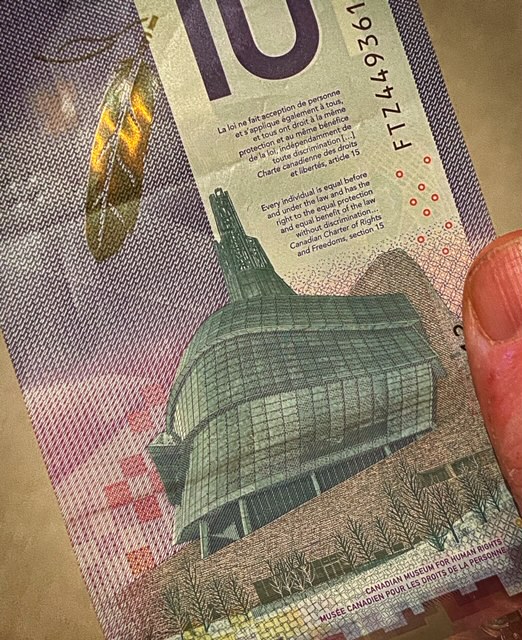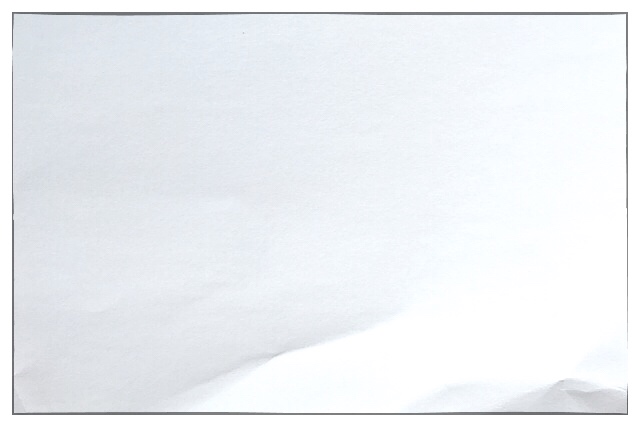It’s 9:23 a.m. on Wednesday. The street is not silent as cars and bikes stream by on this hot summer morning..
A young woman sits quietly on a metal bench in the shadow of the condominium across the street, knapsack across her lap and lighter in hand, the small flame heating up whatever she has in her hand. An older guy stands over her, looking down, syringe in hand, oblivious as I walk by.
The street corner is littered with take-away coffee cups, plastic bottles, bags, blue straps and used syringes.
This has become a common street corner scene in downtown Toronto.
Last Sunday, about 8:30 p.m., I watched one man help another man find a vein on the same sidewalk bench, and then stick a needle in his arm.
Sure enough, the needle was there the next morning, along with others.
Sadly Sunday evening’s scene was 50 steps away from a safe injection site that offers supervised drug injection by harm-reduction workers. The facility was open at the time, but this did not make a difference to these users.
It’s sad that any addiction has come to this point.
It is even sadder that those who chose to use do so on city streets where the remains of their deeds are tossed away in places people, children, and dogs walk regularly.
There is evidence of hard drug use on these streets pretty much each day. Used syringes are becoming as common as discarded facemasks. I often phone 311 and provide a description and coordinates, often more then one needle at a time, in several different places.
The next day those needles, or hypodermic syringes, may not be there, but others are.
Daily I walk these streets, usually early morning when there are fewer people out and about. Social distancing is easier. Daily exercise is necessary.
Each day I become more concerned for my safety and for that of my neighbours.
When the safe injection site opened, much was said about this facility making the streets safer.
What we have seen is an influx of traffic.
The streets are not safer; not for those who pass by.
-
The Streets Are Not Safer
-
Not Healthy For Campers Or Community
It has taken a pandemic to cast eyes on the issue of homelessness in Toronto
Seeing the problem is easy. Fixing it, apparently, is not.
With COVID-19 and dangers of its spread, along with respecting social distancing, space in city shelters has been dramatically reduced over past months. Some temporary respite shelter space has been set up, and reportedly city agencies were offering space in some hotels, but there simply is not the available space to handle an issue of this magnitude.
For weeks now, tents have been popping up in a couple of downtown parks. These encampments continue to grow. There are close to 50 tents set up on any given day in Moss Park.
Each morning I walk by the encampment. I see the garbage spread across the grass, the feces and piss puddles in surrounding lanes, and the used needles on the sidewalk.
It’s not healthy for either the campers or for the community.
There was a recent stabbing in the park, the victim listed in serious condition. Police reports do not indicate an arrest.
But the Toronto Police do report one of the tents was being used to “prepare and sell drugs.” A week old news release indicates a quantity of Fentanyl was seized along with cocaine, cash, and a loaded Smith and Wesson semi-automatic firearm.
Three people were arrested.
And the tents remain. -
Sounds Like Canada
When I moved from Winnipeg to Toronto five years ago, all that came with me was what would fit in the car. I whittled down a substantial vinyl collection and brought with me what I considered to be essential albums.
I later noticed how many of those albums were from Canadian bands, groups and musicians.
I grew up listening to music and I still do. Regularly. Every day,
I listen to both new and old music (classic is often an overused, under-appreciated term). I listen to what matters (or mattered) at the time, all the time.
How could I not? My history, my memory, has a soundtrack.
I’ve always considered music to be a necessity rather than a luxury.I even spontaneously popped into Sonic Boom yesterday and spent more money than I intended.
Most of my newest music was made in the past year or two but that is not always the case. Sometimes I’ll go way back.
Often, I end up in my own country’s musical landscape.
Today I’m going to explore that landscape.
What else are you to do on a national holiday intended to celebrate how great this country is? There are not a lot of public celebrations today; this pandemic and its further dangers have, pretty much taken care of that.
Yes, our national broadcaster is throwing something together across all its platforms to pay heed to the fact it is our national broadcaster, but haven’t we all spent too much time in front of a screen over these past couple of months?
Me, today, I’m going to sift through my albums and compact discs and play, in no certain order, music from artists that have shaped my life and made a cultural contribution to our identity as Canadians.
I’m going to listen to rock, pop, jazz and classical music that I’ve invested in over the years and today concentrate on a purely Canadian playlist.
I can’t think of a better way to celebrate Canada.
I’ll be posting album covers of what I’m playing on Instagram as I make my way through the day (find me at jg_lewis). Sometimes I might even tell you something about the album, or what or why I remember about the time, or a song. Mostly though, I’ll let the music speak for itself.
Today is all about Canada. Happy Canada Day.
-
CMHR Image Not Right
I used to look at the image of the Canadian Museum for Human Rights on the back of this country’s $10 banknote with pride.
Now I can only see hypocrisy, and believe the museum should be removed from our currency.
The CMHR was once the dream of Winnipeg lawyer, politician and media mogul Izzy Asper to have a place where students and the public could learn about issues, achievements or examples of a betrayal of, or commitment to, human rights. The CMHR became the country’s first national museum outside of Ottawa when it opened in my home province of Manitoba in 2014.
Of course I was proud.
Then last week it was reported by CBC that management of the crown corporation and national museum would sometimes ask current and former employees to not show any LGBTQ content on some tours, at the request of certain guests or religious schools. Winnipeg museum staff said the practice was common for at least two years. I was sickened by the thought.
The museum has confirmed that from January 2015 to the middle of 2017, tours could request certain content be excluded. By participating in the act of censorship and suppression of the truth, the CMHR becomes an example of the type of discrimination the museum was designed to identify.
In light of the news coverage, CMHR CEO John Young announced he would not stay on at the museum when his term is up later this year. More recent news reports indicate a Winnipeg lawyer has been hired to lead a review into complaints of racism, homophobia and other forms of discrimination at the museum.
We can hope the review will be more transparent than the museum has been.
I have followed the CMHR from the time it was only a vision, through years of negotiations to secure millions and millions and millions of dollars in governmental funding and private donations, and then watched as the architectural wonder was constructed. I moved away from Winnipeg before the museum officially opened, but have visited the CMHR each time I have returned to the city.
I will certainly visit the museum again when I next return to the city as there is so much to take in, but I believe the institution no longer deserves a place of honour on our currency.
Museum management has failed the people of this country by not fulfilling its mandate and holding itself up to its intended high standard. The museum has not been true to what should be common elements of inclusion, diversity, respect and honesty.
Next to the banknote image of the museum is text from section 15 of the Canadian Charter of Rights and Freedoms quoting that ‘Every individual is equal before and under the law and has the right to equal protection and equal benefit of the law without discrimination…’
It is disappointing to hear the news that Canadian Museum for Human Rights could not live up to its potential, particularly in a month where the entire world is looking closely at human rights, and during a period we now accept annually as Pride Month where LGBTQ celebrations and parades have been limited because of COVID-19.
In light of the disingenuous actions of the museum management, I urge you to contact Prime Minister Justin Trudeau and finance minister Bill Morneau (minister responsible for the Bank of Canada) and demand that the image of the museum be removed from the backside of further issues of our $10 bill.
It no longer has the same value.To voice your concern, email
justin.trudeau@parl.gc.ca
Bill.Morneau@parl.gc.ca -
Anything And Everything
It is vast, and unblemished, maybe even uninteresting, at first.
At the beginning of the day, to the naked eye, it is nothing more than a vacant page, or space between the lines. Upon closer inspection, it is anything but.
A page lies as open as an eye. This is my landscape. You see white space; I see themes and dreams, and possibility. The view changes, as does my mind, by the minute, moment-to-moment, year to fear, as each day becomes each day, and I am still here.
The landscape changes, oft times like a blur through a car window. It’s like that when you travel forward. Look closely at what you see, take note of the spared indifference to what is, and what could be. This is more than my breath, voice, thoughts, leftovers or left behinds. It is more than indulgence and possessions.
It is there for a reason.
This is a world of secrets in a universe of sounds. It contains sins and silence, handily left for obsessive thoughts, and action. I know no discomfort, or a source for objective reasoning, so it should be as it flows, and like any great adventure you are never aware when it stops. There are no endings.
It is not about anything, or could be about everything. It is my landscape.
As permanent as chalked messages on a sidewalk, as indelible as DNA, there is something here than need not be understood, but it can be. And should. If you take the time, take what is mine, and read between the lines to see what might matter now to you, or me.
This is my landscape. It may not all be personal, but it is intimate, and available. It is not a complete picture, but it is honest. It is here to entertain and inform, even advise, but take my words with a grain of fault, for there is nothing more human than a human being struggling to exist. I do both; struggle, and exist.
This is my landscape, even when it is all mixed up. I might say some things now and then I am now only trying to comprehend, and admittedly there is naivety, as I want to learn, to know, to understand. So it goes from society’s distinct or damaged black and white to every Kodachrome colour that is, sadly, missing in this day and age. I use the past only as a reference, and not a regret; I have none; I can’t, at least not yet.
Judge me not by my words or what I believe, take nothing for granted, if you know what I mean. Beneath all adventures, or even my stillness, is a strong inner voice. Not by purchase and not by choice. My blood boils with anger, and terror, and compassion. And love. I have a purpose, with promise, thoughts ever full of hope, evermore. Finding momentum to even my most dormant dreams I break it down again, and again.
Again. These are my eyes.
There is no revolution, not right now. Perhaps, maybe, there will be, for someone, somewhere else, a person to show something new about you, or your inner being. It may not be me, but keep reading, to see.
This is my landscape. These are my dreams.© 2016 j.g. lewis

